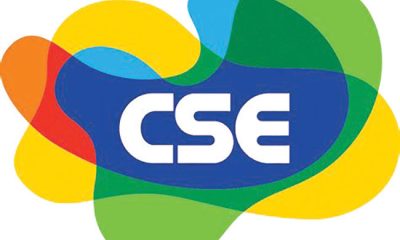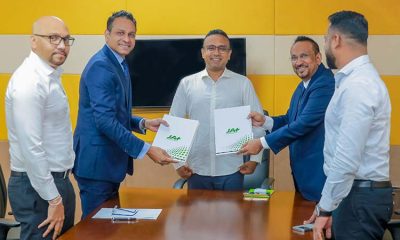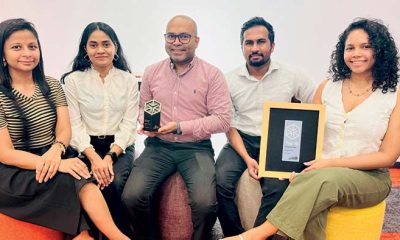News
Expert advises public, private sectors invest in modern technology as in HK, Taiwan, Singapore

Long-term solutions even after present pandemic
By Rathindra Kuruwita
The public and private sectors should invest in the latest technologies to prevent the spread of COVID-19 and remotely identify those who had contracted the virus to minimise disruptions to the economy, Pharmaceutical and healthcare management consultant Dr. Sanjaya Perera told The Island yesterday.
Dr. Perera said that since 2020 three lockdowns had been imposed, but the country had not benefited.
“We have also imposed lockdowns at the wrong times. We allowed people to party in April 2021. We also relaxed too fast when experts said we have the delta variant in Colombo. Everyone agrees that closing the country almost at regular intervals is bad, we have to take steps so that this doesn’t happen,” he said.
 Perera, who works as a consultant in East Asia and Europe said that investment in new technology and adhering to strict travel guidelines had helped many institutions to function without continuous disruptions. Last year, a number of institutions had introduced machines that could easily detect those with COVID-19 and protect those who worked in air conditioned environments, he said.
Perera, who works as a consultant in East Asia and Europe said that investment in new technology and adhering to strict travel guidelines had helped many institutions to function without continuous disruptions. Last year, a number of institutions had introduced machines that could easily detect those with COVID-19 and protect those who worked in air conditioned environments, he said.
“For example there are new technologies like infrared thermal monitoring, which are widely used in Singapore, Taiwan and Hong Kong. High-performance infrared thermal cameras are set-up at airports or at entrances to offices to capture people’s thermal images in real time, easily identifying people with fever. There are new machines powered by artificial intelligence that can identify those who have 0.01 higher temperature. These machines can also work as an attendance register that can be accessed by HR officers from anywhere. I am glad that some top private firms have already set up these machines,” he said.
Perera said that Sri Lanka had kept its airports open for the most part of the pandemic and a number of COVID-19 infected people had come through without detection. Health sector unions had called for stricter measures but the government had cited inconveniences to passengers for not implementing tougher policies.
“Singapore Airport is now using a breath test to detect Covid-19 that gives accurate results within a minute. A person blows into a one-way valve mouthpiece, and compounds in the person’s breath – think of it as a breath signature – are compared by machine learning software against the sort of breath signature that would be expected from someone who’s Covid-positive. We can clear passengers in minutes. If the government wants to keep the airport open it should invest in these technologies,” he said.
Dr. Perera pointed out that SARS-CoV-2 could remain on various surfaces and that caused serious issues when schools, offices and factories were open. The virus could remain outside, especially in places that were not exposed to the sun and in air conditioned places.
In the past year researchers had looked at UV radiation, in particular UV-C to inactivate different viruses, including SARS-CoV-2, he added
“With machines that emit UV-C radiation you can easily disinfect surfaces. If you place such a machine near an AC machine, it can kill most of the viruses there. There are also handheld devices that people can use to disinfect documents, pens, and other things that you touch. Another technology we can use is pathogen testing. We can place this unit at the office, and it will capture pathogens that people at work emit. At the end of the day, a lab can test and find out if a person there has contracted COVID-19. This way we don’t need to check everyone at work, we can just check the people who came on that day,” he said.
Dr. Perera said that while some of those technologies were expensive, investing on the long term solutions and protocols would benefit the economy greatly in the long term. Already the government spent large amounts of money on testing, quarantining and treating people and frequent lockdowns too had cost colossal sums, he said.
“Also these investments are not only for COVID-19. Even if COVID goes away, we can still use this equipment to make the office environment safer for the workers. A healthy workforce is good for business and both the private and public sector must understand this,” he said.
Latest News
Heat Index at Caution level in Northern, North-central, Western, Sabaragamuwa, Eastern, Southern and North-Western provinces and Monaragala district
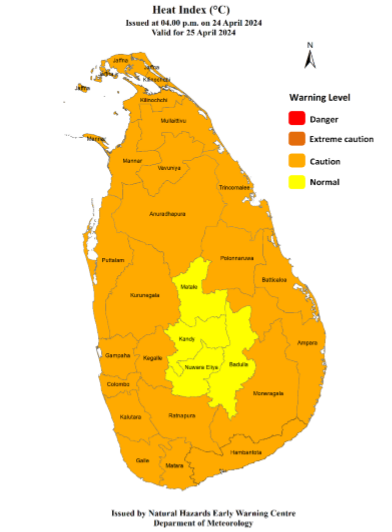
Heat index Advisory issued by the Natural Hazards Early Warning Centre At 4.00 p.m. 24 April 2024, valid for 25 April 2024
Heat index, the temperature felt on human body is expected to increase up to ‘Caution level’ at some places in Northern, North-central, Western, Sabaragamuwa, Eastern, Southern and North-Western provinces and Monaragala district.
The Heat Index Forecast is calculated by using relative humidity and maximum temperature and this is the condition that is felt on your body. This is not the forecast of maximum temperature. It is generated by the Department of Meteorology for the next day period and prepared by using global numerical weather prediction model data.
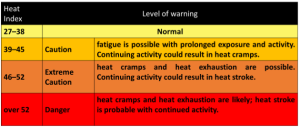
Effect of the heat index on human body is mentioned in the above table and it is prepared on the advice of the Ministry of Health and Indigenous Medical Services.
ACTION REQUIRED
Job sites: Stay hydrated and takes breaks in the shade as often as possible.
Indoors: Check up on the elderly and the sick.
Vehicles: Never leave children unattended.
Outdoors: Limit strenuous outdoor activities, find shade and stay hydrated.
Dress: Wear lightweight and white or light-colored clothing.
Note:
In addition, please refer to advisories issued by the Disaster Preparedness & Response Division, Ministry of Health in this regard as well. For further clarifications please contact 011-7446491.
News
Two Indians recruiting Lanka’s ex-servicemen for Russia-Ukraine war

MP Dayasiri Jayasekera informs House:
By Saman Indrajith
Parliament was yesterday informed that two Indians were recruiting ex-Sri Lankan servicemen to fight in the Russia-Ukraine war. SLFP MP Dayasiri Jayasekera said the leading operator had identified himself as a lawyer while his brother called himself a doctor.
They were in touch with ex-servicemen of Sri Lanka and offering them jobs as general camp helpers for either Ukraine or Russia, Jayasekera said. “But once they reach either Russia or Ukraine, they are not rostered for general camp duties; they are made to fight. So, Lankan ex-servicemen end up shooting one another from Russian and Ukrainian sides, the MP said, adding that a Lankan ex-serviceman, by the name of Kusantha Gunawardena had gone missing. He had been recruited as a general camp helper and sent to a Donetsk-region camp identified as BL/Y/41698/NO3.
There he had been deployed to work in a military tank which came under attack by Ukrainian drones , Jayasekera said. Two of his colleagues were killed but Gunawardena survived the attack. “However, there is no more information about this soldier. Now, he is missing,” Jayasekera said.
These ex-servicemen are lured through online and social media advertisements, Jayasekera said. “There are reports that a major is in custody for his involvement in enticing ex-servicemen to fight in Russia. Another former officer’s name, too, has been mentioned regarding this. Each ex-serviceman has been asked to pay Rs 1.8 million each to the racketeers to secure the jobs.
Leader of the House Minister Susil Premajayantha said that the government would respond to the matter soon.
Justice Minister Dr. Wijeyadasa Rajapakshe said that there were several investigations in progress by several agencies, including the police, military as well as the Foreign Ministry. There are reports of Sri Lankan ex-servicemen fighting in the Russian and Ukrainian armies as mercenaries. The police have received information that the recruitments are being conducted by institutions operating as employment agencies. Public Security Minister Tiran Alles would appraise the House of the progress of those investigations on Thursday, Minister Rajapakshe said.
News
Uma Oya project inaugurated
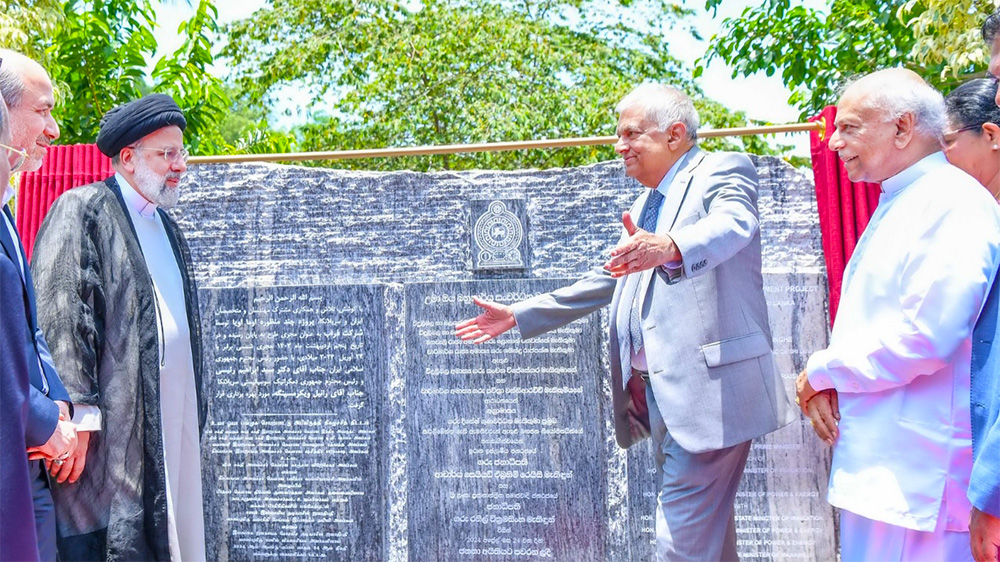
Iranian President Dr. Seyyed Ebrahim Raisi and President Ranil Wickremesinghe yesterday (24) inaugurated the Uma Oya Multipurpose Development Project (UOMDP).
The Iranian leader arrived in Sri Lanka under tight security via the Mattala International Airport, where he was accorded a warm welcome by Prime Minister Dinesh Gunawardena.
President Wickremesinghe invited Dr. Raisi though some interested parties are believed to have expressed concern over the move against the rising tensions in West Asia in the wake of tit-for-tat Iranian retaliation for the Israeli bombing of the Iranian consulate in Damascus.
Dr. Mahmoud Ahmadinejad’s visit in April 2008 was the last such by an Iranian President.
The Iranian-funded project would generate 120 MW of additional hydro power to Sri Lanka.
The Uma Oya Project, one of the major development projects in recent times, was initiated in 2007 when Dr. Mahmoud Ahmadinejad was the President of Iran and Mahinda Rajapaksa was the President of Sri Lanka. The Sri Lankan then Ambassador to Tehran (2006-2012)
M. M. Zuhair, PC successfully initiated discussions with Iranian authorities for an interest-free oil purchase package on deferred payment terms at the height of the war with the LTTE; another US $ 105 million Rural Electrification project, plus the Uma Oya multi-Purpose Project, initially estimated at US $ 450 Million, all of which were signed by President Mahinda Rajapaksa, when he visited Tehran on 27/11/2007, and successfully concluded with the Oma Oya being the last to be completed.
Iranian President Dr. Ahmadinejad offered to modernise the oil refinery at Sapugaskanda when he paid a visit to Sri Lanka in 2008 but was not pursued by Sri Lanka following US sanctions imposed for the first time on the Iranian Central Bank with implications for Sri Lankan banks dealing with the Iranian Central Bank.
Iran and Sri Lanka signed five memorandums of understanding (MoUs) yesterday, aimed at further bolstering bilateral relations between the two countries.
The Presidential Secretariat said that the primary objective of the Uma Oya project is to alleviate water scarcity in the southeastern dry region of the country by redirecting an annual average of 145 million cubic meters of excess water from the Uma Oya basin to the Kirindi Oya basin.
As a result of this project, approximately 4,500 hectares of new land and 1,500 hectares of existing agricultural land in the Moneragala District would receive water, the Presidential Secretariat said, adding that Badulla, Moneragala, and Hambantota would benefit from 39 million cubic meters of water for drinking and industrial purposes, while generating and adding 290 GWh of electrical energy annually to the National Grid.
-

 Business4 days ago
Business4 days agoCEAT Kelani launches three new radial tyre variants in ‘Orion Brawo’ range
-

 Business6 days ago
Business6 days agoDialog-Airtel Lanka merger comes centre stage
-

 Business3 days ago
Business3 days agoCeyline Travels and MBA Alumni Association of University of Colombo sign MOU
-

 Business6 days ago
Business6 days agoSLFEA appoints JAT as a Facilitation Partner for training painters to provide overseas employment opportunities
-

 Business4 days ago
Business4 days agoHayleys Fabric celebrates triple triumph at ISPO Textrends Spring/Summer 2026
-

 Business5 days ago
Business5 days agoUrgent appeal from Sri Lankan exporters on rupee appreciation
-

 Business3 days ago
Business3 days agoMaldivian to launch direct flights to Colombo
-

 Sports4 days ago
Sports4 days agoHello Madras, ‘ai api kaluda?’














